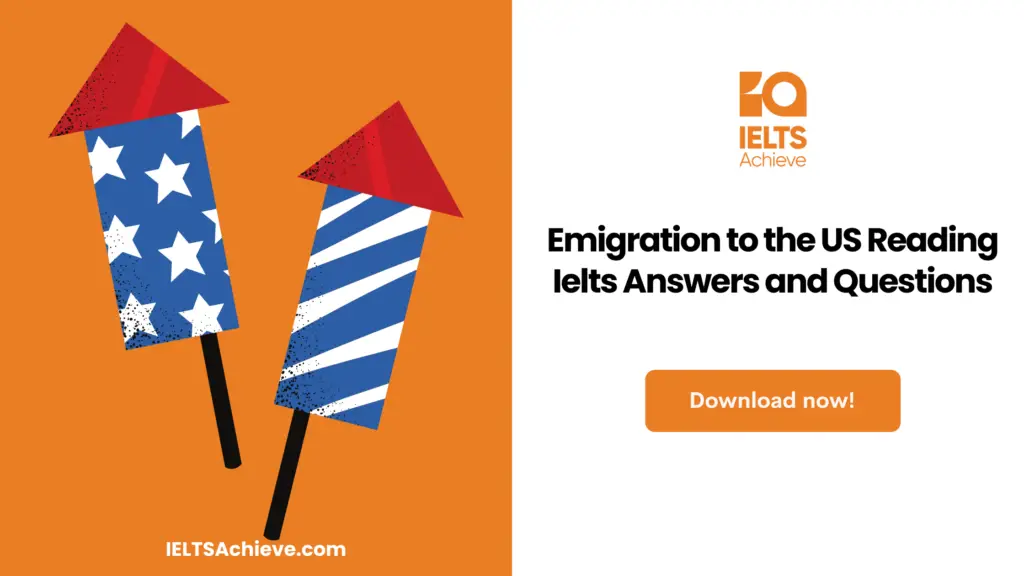The Blog post contains the following IELTS Reading Questions:
- IELTS Reading Multiple Choice Questions.
- IELTS Reading Summary Completion Questions.
- IELTS Reading Matching Sentence Endings Questions.
IELTS Reading Passage – Emigration to the US

Emigration to the US
Migrations have played a significant role in the development of America. The migration that occurred in the roughly 100 years between the Battle of Waterloo and the start of World War I must unquestionably be ranked as the largest peaceful migration in recorded history, and likely the largest migration of any kind ever. In addition to the significant numbers travelling to Argentina and Australia, it is estimated that over 35 million people entered the United States during that time. If so, historians will be watching a pattern of a whole continent in motion that was first established in nineteenth-century Europe. Historians may conclude that this movement was dwarfed in the twentieth and later centuries when Africa, Asia, and South America began to send forth their peoples. Only the French appeared to be largely virus-immune. If not, everyone caught it and travelled. English, Irish, Welsh, Scots, Germans, Scandinavians, Spaniards, Italians, Poles, Greeks, Jews, Portuguese, Dutch, Hungarians, Czechs, Croats, Slovenes, Serbs, Slovaks, Ukrainians, Lithuanians, Russians, Basques. There were both broad and specific factors.
Regarding the broad causes, the growing population meant that more people were attempting to make a living on a smaller piece of land, which inevitably led to some being pushed off of it. Every major European power maintained large armies and navies, which required modern equipment. As a result, every major European state had to impose greater and heavier taxes, which many people found difficult or impossible to pay,and mass conscription, which many people, understandably, sought to avoid. The advent of free trade, which was tearing down the old mercantilist barriers everywhere, combined with the opening up of new, incredibly productive lands in the United States, Canada, Australia, and New Zealand, along with the availability of steamers and steam trains to distribute their produce, made it impossible for European peasants to compete effectively in the global market: They would always be undersold, especially since the introduction of free trade was dismantling all of the traditional mercantilist restrictions. Other factors made steam significant as well. It became quite simple to travel by land and sea and to receive news from other countries. The spread of news was greatly accelerated by the development of the electric telegraph, particularly after a cable was successfully extended across the Atlantic in 1866. For the first time, mass-circulation newspapers were made possible by modern printing and paper-making equipment as well as a fast growing literacy rate. In short, opportunities expanded, even for stay-at-home parents. The French Revolution, the Industrial Revolution, and the numerous wars and tumults of nineteenth-century Europe all caused major social disruptions that destroyed pre-existing norms. The laws governing land tenure were fundamentally changed, new states were created, old ones vanished, borders were redrawn, internal customs barriers and feudal dues vanished, payment in cash took the place of payment in kind, new industries sparked new desires, and the self-sufficiency of peasants households as well as the viability of their products were destroyed. Rural Europe’s fundamental structure underwent transformation.The happy times pulled, the bad times pushed, American factories were frequently desperate for labour, so it is not surprising that many moved.
Just as significant as these generic explanations were specific ones. For instance, the devastating potato famine in Eland occurred between 1845 and 1848. Millions of people fled the country due to disease or starvation (1846-51). After the Great Famine was finished, things did not get much better because smaller famines followed, and the fundamental flaws in the Irish economy rendered the future dismal in any case. Mass migration was a natural course of action, initially to America and then, progressively in the 20th century, to England and Scotland. With the Irish instance, as in many others, letters sent home and money remitted helped to stimulate emigration. Thus, the first explorers contributed to covering the costs of their successors. Sometimes, political motives could also push Europeans to cross the Atlantic. Following the defeat of the liberal revolution of the previous year, many Germans fled in 1848. (However, many thousands of people left for no other reason than economic).
If these outside influences failed, American business was more than willing to step in. Since the country’s earliest beginnings, high labour costs had been a recurring theme; but, as the Industrial Revolution took hold, demand for labourers increased dramatically. The number of Americans was insufficient to meet the demand; even if family farms were prospering, as they generally did until the 1880s, or if new land was available in the West, the drift out of agriculture (which was becoming a permanent feature of America as well as other industrialised societies) would not produce enough labour to fill the factories. Employers then searched throughout Europe for the workers they required, whether they were competent, like Cornish miners, or unskilled, like Irish navvies. The transcontinental railroads then desperately required labourers and settlers for their Western land grants since they couldn’t turn a profit unless the areas their tracks passed were consistently producing crops that needed to be transported to markets. Every port in Europe soon became aware of the activity of American shipping companies and their agents as they competed to provide favourable terms to potential immigrants. They posted flyers, made newspaper announcements, responded to enquiries politely, and guided their clients from their home villages to the docks via train before ensuring they were securely stored in the steerage.
Emigration to the US IELTS reading questions
Question 1-4
Choose the correct fetter A, B, C or D. Write it in box 1-4 on your answer sheet.
1) Which of the following statements resembles the 1st paragraph.
- In all likelihood, we will never see another era of mass migration like the one that occurred in the 19th century.
- To what extent there was indeed mass migration in the nineteenth century is debated.
- The experience of emigration may be more positive for certain nations than for others.
- Emigration from regions outside of Europe has the potential to outnumber that of Europe itself.
2) Which of the following did the great European power maintain?
- Armies and navies.
- Mass conscription.
- Peasants.
- Land.
3) What was cutting down the old mercantilist barriers?
- Opening up of new, incredibly productive lands in the United States, Canada, Australia, and New Zealand.
- American factories’ desperateness for labour.
- The occurrence of free trade.
- The French Revolution, the Industrial Revolution, and the numerous wars and tumults of nineteenth-century Europe.
4) Which is the reason why European farmers couldn’t cut it in the global marketplace?
- Opening up of new, incredibly productive lands in the United States, Canada, Australia, and New Zealand.
- Availability of steamers and steam trains to distribute their produce.
- The increased rate of imposed taxes for the maintenance of the armies and navies.
- Both A and B.
Ready to improve your performance in Multiple Choice Questions (MCQs)? Click here to access our comprehensive guide on how to tackle MCQs effectively in the IELTS Reading section.
Questions 5-9
Complete the sentences below with words taken from Reading Passage 1.Use NO MORE THAN THREE WORDS for each. Write answers, your answers in boxes 2-9 on your answer sheet.
GENERAL REASONS FOR EMIGRATION TO THE US
People had increased access to information about the globe outside of their own country because there were more 5)………… 6)……….. had been formed as a result of significant historical events. Demand changed as a result of the creation of 7)……………………………… Desolation in forthcoming time was because of the 8)………………………….in the Irish economy and 9)………………….
Questions 10-13
Complete each sentence with the correct ending A-H from the box below. Write the correct letter A-H in boxes 10-13 on your answer sheet.
10) The conclusion of Ireland’s potato famine
11) People who emigrated to Ireland
12) Movement off the land in the US
13) The establishment of railroad firms in the West US
A. Made people hesitant to relocate elsewhere.
B. Caused an increase in the demand for agricultural labourers.
C. Offered proof of the benefits of emigration.
D. Gave the sense that moving somewhere else would be advantageous.
E. Didn’t do anything to help the situation of the majority of the populace.
F. Took a long time to have any genuine effect.
G. Didn’t fulfil the qualifications for the job.
H. Produced an overabundance of emigrants.
Ready to sharpen your skills in Matching Sentence Endings? Click here to discover expert strategies and techniques for accurately matching sentence endings with the corresponding information in the IELTS Reading section.
Unlock your full potential in the IELTS Reading section – Visit our IELTS Reading Practice Question Answer page now!
Recommended Questions:
Renewable Energy IELTS Reading Question with Answer
Emigration to the US Reading
1. D
2. A
3. C
4. D
5. LITERACY
6. NEW STATES
7. NEW INDUSTRIES
8. FUNDAMENTAL FLAWS
9. GREAT FAMINE OR POTATO FAMINE
10. E
11. C
12. G
13. B

We hope you found this post useful in helping you to study for the IELTS Test. If you have any questions please let us know in the comments below or on the Facebook page.
The best way to keep up to date with posts like this is to like us on Facebook, then follow us on Instagram and Pinterest. If you need help preparing for the IELTS Test, join the IELTS Achieve Academy and see how we can assist you to achieve your desired band score. We offer an essay correction service, mock exams and online courses.

